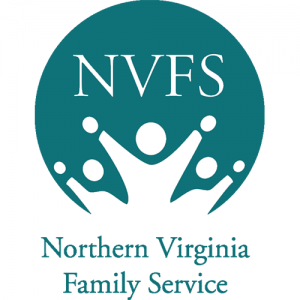
(Posted 2022 May; Updated 2024 August)
Northern Virginia Family Service Provides a Century of Support
Northern Virginia Family Service (NVFS), established in 1924 to help families in need, has expanded its services over the decades to help families become stable and self-sufficient, lifting people out of poverty to hopeful futures. Volunteer Voices sat down with Paola Sandoval-Moshenberg, director of NVFS’ Multicultural Center, to talk about the nonprofit and its partnership with the Domestic Violence Action Center (DVAC). This is an excerpt of that conversation.

Talk about the history of Northern Virginia Family Service. Your website says you help lift families and people out of poverty to hopeful futures, but how does NVFS do this?
Paola Sandoval-Moshenberg: NVFS has been around for100 years. It started in Alexandria with a group of people trying to help families with needs at the time. A lack of coal, for example. Over the years, those needs have changed. We focus on community needs—on people who are not being served, people who are disenfranchised. [We are made up of] different divisions that provide homeless services—that’s a hunger resource center, shelter, a community shelter; early childhood education, we manage some of the Head Start and Early Head Start in the area; healthy pregnancies for first time moms and teen moms; workforce development; health services, including prevention, education, dental support, and prescription support; youth initiatives that address the needs of children and youth, gang prevention, and family reunification; a foster care program; and the Multicultural Center, where I’m director, which deals with the immigrant and diverse population in the area.
You’re part of the group of partners in DVAC. Where does gender-based violence fit in with all of NVFS’ services?
Gender-based violence is pervasive in our community. We can have, at any point, clients who are struggling with gender-based violence in any of our services. The Multicultural Center provides three services: 1) immigration and legal services, 2) mental health, and 3) social services and case management. Within mental health we recognize domestic and sexual violence are common struggles with our clients. Some of them present with mental struggles related to current or past experiences of violence in their homes. Because of this, we became one of the earliest partners with DVAC.
Let’s talk about that partnership. Why did NVFS think this partnership would be beneficial?
Within the Multicultural Center, we train our counselors in domestic violence and the specific issues that can be related to issues of domestic violence for our clients. NVFS has a huge experience with multicultural clients. We have staff that speak six different languages. Not only do we focus on diversity in language, but also on cultural diversity.
Domestic violence is perceived through different lenses by different cultures. We educate others on how to [elevate the discussion] about the topic without offense or making people shy away from services they very much need.
What does NVFS provide that other DVAC partners might not?
I can’t speak to what other partners don’t have. I know the Multicultural Center prides itself on providing culturally appropriate, trauma-informed services for everybody who comes to us. We provide it through a multicultural, multilingual staff. We understand that talking about your emotions in a second language might be challenging. Not every word has a translation. Words might not match what you are trying to express. We understand the importance of having someone you can talk with. It’s why our partners reach out to us. We train their staff on how to properly serve those clients or they can refer clients when services can be better provided by us.
What’s the best thing about this partnership?
Being on the same page. The collaboration that allows us to cross-train and cross-educate. There is support; there is communication. We are all in the know so we can act as a team, respond to community needs as a team. The partnership is multilayered. There are so many aspects to gender-based violence—legal, cultural, mental health, physical—that having everyone chipping in their own perspective from their own professional approach is so helpful in understanding the whole, the integral way these human beings need to be approached.
Are there challenges with being part of this partnership?
Any relationship has challenges. We are different organizations with different rules, different databases. Even when we try to talk the same language, we have different priorities at different times. The pace in one organization can be different than in another. Dealing with logistics can be challenging at times. When it comes to collecting data and having concrete information about quality of services and referrals, it gets tricky.
What else should we know about NVFS?
I am giving you my perspective from my corner. From where I sit, team collaboration is huge. It’s hugely important in the kind of work we do. To be able to grow and support each other and continue moving forward. We don’t close our doors to anyone. We don’t reject anyone who needs our services. If they need our services, they will be welcome. We are an organization that does a lot of self-reflection, we talk about processes, systems, people, impact, how we can get better. We try to be as good to our staff as we are to our community because we are part of that community. We are constantly trying to be better.
This article posting is part of the Domestic and Sexual Violence Services' Volunteer Voices monthly newsletter for current and potential volunteers. If you're not already a volunteer, learn how to get involved. Find out about upcoming trainings, volunteer trainings, happenings around the DSVS office and information about articles, books, media recommendations and more.
Learn more about the Domestic and Sexual Violence Services (DSVS).

